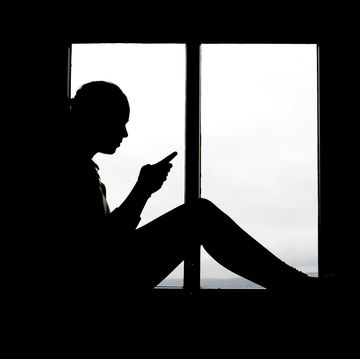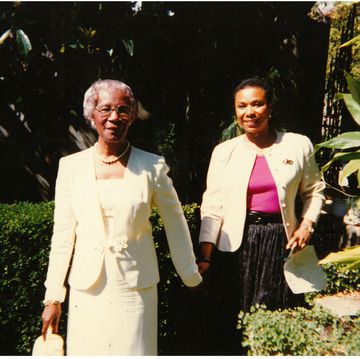You can say it: Life as you know it is completely different right now, and it feels crappy. With COVID-19 sweeping the country and world, major restrictions and regulations have been put in place to help slow the spread of the virus. And those probably feel like, well, major restrictions and regulations on your life.
To be clear, the novel coronavirus is no joke. Even if there aren’t confirmed COVID-19 cases in your area, it’s likely the virus is still circulating near you, says Rajeev Fernando, MD, an infectious disease expert in Southampton, New York.
"Many areas that 'don’t have new coronavirus' really do—there's just a lack of testing," he notes. So on some level, *everyone* must accept this new normal, even if that's tough to do.
But while the virus warrants taking serious precautions, the sensation of feeling trapped and isolated you're likely experiencing right now is far from trivial.
Maybe you had to cancel a family reunion or even your wedding. Or if you’re a parent (like me!), you have to rethink child care, school, and your kid’s social activities, too. Personally, as a freelance writer, working from home is tougher with three kids ranging from 11 months to 7 years old home with me—and I will never again complain about having to rush to kids' activities, or do anything linked with having a normal life. I'm mostly worried about making sure my kids feel a sense of normalcy when life is anything but.
But I'm the first to admit that any of these hurdles can seem like total #FirstWorldProblems. That being said, all types of disruptions can certainly bring on serious disappointment, frustration, and resentment...and then a giant wave of guilt for feeling that way in the first place when there are people who have it far worse.
Plenty of people are opening up on social media about the personal disappointment that comes with novel coronavirus:
You know all of the restrictions in place are for the greater good...so how do you reconcile all of this emotionally? You’re only human, after all. Well, take a deep breath and pull up a seat. Ahead, some sound advice from a mental health pro on how to cope with any woe-is-me feels as you settle into this new normal.
First, acknowledge your gloomy emotions—and then forgive yourself.
No, you’re not a monster for feeling this way. “All feelings and reactions are pretty normal, including these,” says Elena Welsh, PhD, a licensed clinical psychologist located in Los Angeles. “As a therapist, people will be so ashamed to tell you a thought and, when they get it out, you’ve already heard it eight times that day.”
Whew. Feeling sorry for yourself during this time is no exception, she says. “People have to adapt to change, and that can make you feel upset or angry,” she adds. Reminding yourself that you’re *not* alone in this can help.
Cut off self-loathing thoughts ASAP.
Criticizing yourself for having human emotions is going to do zero for you in the mental health department. “There’s a strong correlation between criticism and depression and, on the flip side, between having compassion and higher mood states,” Welsh says. Basically, judging yourself for having feelings is only going to make you feel worse, and you don't need that kind of negativity in your life RN.
If you can catch yourself having these crappy thoughts, Welsh recommends documenting them. “Write down that initial thought, and then shift it and say something totally reasonable,” she says. Try, for example: "I’m upset that my friend's wedding is postponed, but I was really looking forward to being her maid of honor." (You want to clearly identify why that particular change of plans or new circumstance feels disappointing to you to help validate your sentiment.)
If that’s still a struggle, try to think about what you’d say to someone you love if they shared that same thought. Think of it this way: If your best friend came to you and said she's having a hard time coping because she really misses the routine of her weekly cycling class, you'd listen to her, tell her it's okay that she's feeling that way, and try to offer up advice on what at-home exercises she can sub in to get the same endorphin boost. Now, do it for you.
"We all tend to show more compassion and forgiveness to others—show it to yourself," Welsh says.
Ask yourself *why* you’re feeling this way.
Sometimes it’s pretty simple: You’re pissed because your beach trip has been canceled, it was hard to get the days off, and there’s nothing you can do about it. But sometimes the reason for feeling bummed is less clear.
A less-clear example? If you’re upset that you can’t do happy hour drinks right now, Welsh recommends trying to get to the source of those emotions. Maybe it’s because you’re feeling lonely and like you need to connect with someone. So, make a date with your girls to have a drink together over FaceTime. It’s not perfect, but at least you’ll be able to catch up.
Focus on others.
That friend you have who is pregnant and scared AF right now? Call her. And check up on your grandparents while you’re at it. “Trying to focus on other people is a great way to take your mind off of what you’re missing,” Welsh says. “It can also help make you feel less anxious and depressed.”
There's research to back this up. In a study in the Journal of Clinical Psychology that followed 47 people who struggle with clinical anxiety and/or depression, people had fewer symptoms associated with their mental health issues when they tried to help others and avoid selfish behavior, when the researchers checked in on their moods at regular intervals.
There are endless ways you can act selflessly and help others during this time. Consider doing the following (your community *and* your emotional well-being will thank you for it):
- Help support a local business that you love that is being impacted by giving a donation or purchasing a gift card (or take out, if it's a restaurant), if you have the financial means.
- Offer to assist with groceries or errands for an elderly or immunocompromised member of your community.
- Reach out to someone you know who is struggling or dealing with anxiety to reassure them and offer them support.
- Create a social media group where community members can join and share their thoughts, hopes, fears, laughs, and more.
Take a sec to think about what you’re grateful for.
Hold the eye roll! Gratitude works. "Practicing gratitude has a correlation with positive emotions," Welsh says. She recommends listing out things what you’re thankful for each day. That can include stuff like being thankful that you still have a job when others are out of work, or even something as small as appreciating the sound of your little one giggling during a board game.
"The more you’re regimented about, the more it will help shift your mood," she says. BTW: If journaling feels like a little too much work, you can also just say the things you're thankful for out loud or even think it. (Pssst, this is a great activity to involve your kids in, too.)
Understand that this may go on for a while.
Honestly, no one knows how long we're all going to be holed up at home. Right now, new cases of COVID-19 have dropped dramatically in China where it all started, and that's definitely good news. Still, this all started in China at the end of December, which means they've been dealing with this for about three months. The same could happen here. We just don't know.
There's no set way to come to terms with this, given that none of us have experienced anything like this before. If you like taking time to pause and reflect and really think things over (and maybe have a good cry!), do that. Or, if you feel better keeping your head down and getting through this one day at a time, that's cool, too. "Honor your own process," Welsh says, as opposed to feeling forced to follow the lead of anyone else in your life. "If you do that, it's less likely you'll cause yourself unnecessary stress."
Attempt to be hopeful about the future, though.
It can feel like you're missing out on a bunch of awesome life experiences, and that can be a tough thing to swallow. But Welsh points out that eventually life *will* get back to normal, and it's crucial to keep reminding yourself of that fact. Also, you're not the only one dealing with this right now; the entire country, and most of the world is, too. While you're in the thick of this experience, even when you're upset that you're missing out on certain things, it's crucial to still allow for moments of happiness. "Give yourself to feel permission to feel joy and laugh," Welsh says. "That's still okay—and even recommended."
Ultimately, Welsh says you’ve just got to cut yourself some slack. "Acknowledge that this is a new situation,” she says. "But practicing basic self-care—exercising, getting enough sleep, and eating well—will help make you less vulnerable to how difficult it is to deal with all of this."













